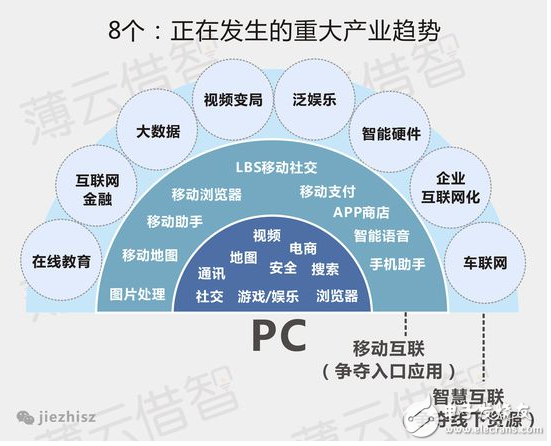The Internet has changed the world, changed its thinking, and changed the reference system of time and space. One day in the mountains, the world has been a thousand years.
From April 1994, China achieved its first full connection with the Internet. Nowadays, the Internet era is booming in 2017. In just 23 years, the Internet has changed our way of life so much. Now, what are the trends in the Internet? How will it further change the world in the future?
From the current situation, "Internet +" is in its infancy, and it is a theoretical stage that is hotly talked about but not implemented. All areas will do some demonstration and exploration for "Internet +", but most businesses will still be in the wait-and-see stage. From the perspective of exploration and practice, Internet merchants will take the initiative than traditional enterprises. After all, these merchants have been using "Internet +" to change more industries since their birth. They have enough experience to follow and can replicate the model of transformation experience. Explore other areas, and then continue to integrate more fields and continue to expand their ecology.
Contrary to traditional enterprises, under the current "national entrepreneurship" era, there are more and more projects combined with the Internet. These projects have been in the form of "Internet +" since their birth, so they do not need to be like traditional enterprises. Transformation and upgrade. "Internet +" is to promote the birth of more Internet entrepreneurship projects, so that no need to spend human, material and financial resources to research and implement industry transformation. It can be said that every social and commercial stage has a normal state and a development trend. The normal state before the "Internet +" proposal is that the millions of enterprises need to be transformed and upgraded. The latter development trend is the outbreak of a large number of "Internet +" models. And the "breaking and standing" of traditional enterprises.

"Internet +" is national. Just like the "three represents", local governments will propose a main construction plan, and then bid or outsource to a service-oriented enterprise that can help enterprises transform. In the long-term implementation of "Internet +", the government will play the role of a leader and promoter.
The first is to find those companies that meet the policy and do a good job and set a benchmark to play an exemplary role.
The second is to explore those companies with potential, in the future can develop into an "Internet +" type of enterprise, which is a case.
The third is to establish an "Internet +" industrial park and incubator that is more grounded and connected with local conditions, and integrate local resources to create a group of enterprises with Internet thinking.
The fourth is to introduce "Internet +" technology, including regularly inviting relevant personnel to train Internet common sense for local enterprises, as well as retraining of on-the-job employees.
The fifth is resource docking, and establish long-term information, assistance, and talent exchange with major Internet companies. In the exchange, Internet companies and traditional enterprises can communicate with each other to facilitate further cooperation.
Trend 2: The rise of "Internet +" service providersNext, there will be a large number of third-party service companies between the government and enterprises. These enterprises may be dominated by Internet companies, but some traditional enterprises will not be ruled out as "Internet +" service providers. In fact, from a service perspective, the transformation of traditional enterprises into "Internet +" service providers is also a transformation. This is an intermediary-like role, they themselves will not engage in the production, manufacturing and operation of Internet + traditional enterprises, but they will help the collaboration between online and offline. More is to do the docking work between the two parties, the profit method is the service fee and various value-added service fees after successful docking.
These value-added services may be training, recruitment, resource search, program design, equipment introduction, workshop renovation, etc. The initial "Internet +" service providers are single-unit operations, and later will develop into a complex, not to exclude platform-type enterprises that will develop into a pure Internet model in the later period. The areas covered by third-party services include big data, cloud systems, e-commerce platforms, O2O service providers, software service providers such as CRM, smart device vendors, robots, and 3D printing.

The first popular occupation in the “Transformation Bonus†period will be “Internet Plus†technology. Due to the needs of society and industry, a large number of professional and technical practitioners will be born. The composition of this professional group will be mature technicians and operators, and more through training personnel. Engaged in the work of "Internet +" service providers, requires everyone to have a general planning idea, they can do things according to "Internet + overall solution", and then have a specific and good areas, such as operations and technology, through Continuously extending downwards to match the traditional enterprise under the line. Even, "Internet +" service providers should provide several service representatives for each enterprise, and the staff "residents" or "residents" provide one-to-one services for enterprises.
Trend 4: The rise of "Internet +" vocational training Governments and enterprises also need more people who understand "Internet +". The online and offline education on "Internet +" training and special training will break out. In the field of online education, vocational education has always been a very hot type of education, and the market share is also relatively large, and there will be great progress every year. In the "Internet +" boom, the rise of the Internet + vocational education will be specifically broken down into the specific work of each job. In fact, these trainings are also the position of Internet companies. Traditional enterprises want to change the enterprise structure and need to be equipped with more professional skills. “Internet +†vocational training is aimed at two groups, one is training for employees in traditional enterprises, and the other is training for people who want to work in the industry.
Indoor Fixed LED Display is a popular product for its high quality, every year sold to at least 80,000 pieces around the world, including Europe, North America, southeast Asia.Compared to other indoor LED display in the market, its biggest advantage is that it can display high-definition images while maintaining low power consumption.Besides, it adopts Die casting aluminum cabinet which is ultra-thin and ultra-light and owns good heat dissipation.Easy to install and maintain and suitable for multiple indoor scenes.
Application:
* Business Organizations:
Supermarket, large-scale shopping malls, star-rated hotels, travel agencies
* Financial Organizations:
Banks, insurance companies, post offices, hospital, schools
* Public Places:
Subway, airports, stations, parks, exhibition halls, stadiums, museums, commercial buildings, meeting rooms
* Entertainments:
Movie theaters, clubs, stages.
Indoor Fixed LED Display,Led Wall Display,Video Wall Display,Outdoor Led Screen Display
Guangzhou Chengwen Photoelectric Technology co.,ltd , https://www.cwleddisplay.com